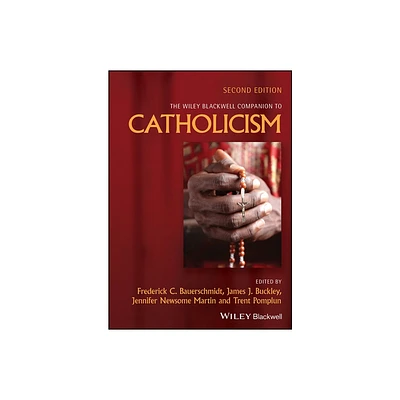Home
The New Blackwell Companion to the Sociology of Religion / Edition 1
Loading Inventory...
Barnes and Noble
The New Blackwell Companion to the Sociology of Religion / Edition 1
Current price: $61.95


Barnes and Noble
The New Blackwell Companion to the Sociology of Religion / Edition 1
Current price: $61.95
Loading Inventory...
Size: OS
*Product Information may vary - to confirm product availability, pricing, and additional information please contact Barnes and Noble
THE NEW BLACKWELL COMPANION TO THE
Sociology of Religion
“…I enjoyed reading this book for its in-depth examination of the complexities of the social forces that are shaping and are being shaped by religious groups around the world. I certainly see this being of theoretical value for researchers engaging the new religious realities of our world.”
Sociology of Religion: A Quarterly Review
“… The new companion is a timely and valuable work, validly updating the original companion and a good addition to the reference shelves of any academic or specialist library.”
Reference Reviews
Reflecting recent developments in the field, this companion provides a comprehensive introduction to the sociology of religion with a clear emphasis on comparative and historical approaches. Covering all the areas relevant to undergraduate courses in this area, the
Companion
begins by laying down the anthropological and sociological foundations of the study of religion and their contemporary developments. It continues with an analysis of both traditional and contemporary forms of organization, such as church–sect typologies as well as “megachurches” and modern forms of spirituality. The secularization and post-secular society debates are considered in depth along with the globalization process, fundamentalism, charismatic movements, and revivalism. It also discusses the sociology of Buddhism, Christianity, Hinduism, Islam, Judaism, and religions of China, as well as the areas of American exceptionalism from de Tocqueville onwards, religious nationalism, women and piety movements, and the spirituality of Native American communities.
Considering new developments in social theory and religion, the collection concludes with a discussion of recent work that attempts to understand the future of religion, blending the sociology of modern societies, anthropological ethnography, and philosophical inquiry.
Sociology of Religion
“…I enjoyed reading this book for its in-depth examination of the complexities of the social forces that are shaping and are being shaped by religious groups around the world. I certainly see this being of theoretical value for researchers engaging the new religious realities of our world.”
Sociology of Religion: A Quarterly Review
“… The new companion is a timely and valuable work, validly updating the original companion and a good addition to the reference shelves of any academic or specialist library.”
Reference Reviews
Reflecting recent developments in the field, this companion provides a comprehensive introduction to the sociology of religion with a clear emphasis on comparative and historical approaches. Covering all the areas relevant to undergraduate courses in this area, the
Companion
begins by laying down the anthropological and sociological foundations of the study of religion and their contemporary developments. It continues with an analysis of both traditional and contemporary forms of organization, such as church–sect typologies as well as “megachurches” and modern forms of spirituality. The secularization and post-secular society debates are considered in depth along with the globalization process, fundamentalism, charismatic movements, and revivalism. It also discusses the sociology of Buddhism, Christianity, Hinduism, Islam, Judaism, and religions of China, as well as the areas of American exceptionalism from de Tocqueville onwards, religious nationalism, women and piety movements, and the spirituality of Native American communities.
Considering new developments in social theory and religion, the collection concludes with a discussion of recent work that attempts to understand the future of religion, blending the sociology of modern societies, anthropological ethnography, and philosophical inquiry.


















